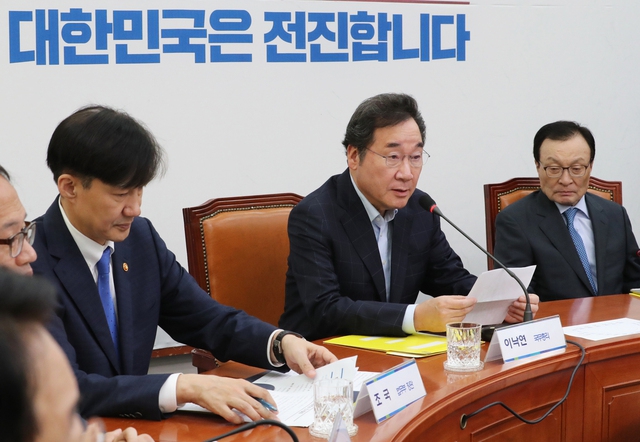 |
|
South Korean Prime Minister Lee Nak-yeon during a Democratic Party on prosecutorial reform at the National Assembly on Oct. 13. (Yonhap News)
|
S. Korean prime minister may meet with Abe during Japan visit
Prime Minister Lee Nak-yeon is set to represent South Korea at the enthronement ceremony for Japanese Emperor Naruhito on Oct. 22. With South Korea-Japan relations at a standstill since Japan’s surprise decision to impose expert control measures in July, many are watching to see whether Lee’s visit can get dialogue started again between the two sides. The Office of the Prime Minister announced on Oct. 13 that Lee “is scheduled to visit Japan form Oct. 22 to 24 to attend the emperor’s enthronement.” The office explained that Lee’s schedule would include attending the ceremony and a palace banquet on Oct. 22 and a banquet hosted by Prime Minister Shinzo Abe on Oct. 23. The visit would also include meetings with major Japanese political and business figures and a roundtable discussion with representatives of the Korean community in Japan. While the office did not state whether Lee and Abe would be meeting, the chances of a brief meeting taking place are reportedly high. “The schedule has not been officially finalized yet, but there is a possibility of a meeting taking place between Prime Minister Lee and Prime Minister Abe,” a South Korean official said. If the two meet, it will be the first high-level dialogue between South Korea and Japan in over a year since a Supreme Court ruling ordering compensation by a Japanese company for forced labor conscription. Japan’s NHK network also reported that Abe was considering holding a brief meeting with Lee if he visited Japan for the enthronement ceremony. Aside from the enthronement date of Oct. 22, Abe is scheduled to have meetings between Oct. 21 and 25 with around 50 overseas VIPs who will be in Japan for the ceremony. Seoul’s finalization of Lee’s attendance at the ceremony just nine days before the event suggests it was waiting until the last minute for forward-thinking measures from the Japanese government to improve bilateral relations. While some had been speculating since last month that Lee would attend the emperor’s enthronement, it was also reported that the Blue House officials discussed the idea of President Moon Jae-in personally visiting Japan to achieve a breakthrough in relations. But with several recent discussions failing to bridge the two sides’ differences, the conclusion was reportedly reached that no concrete outcomes were likely to emerge even if Moon visited. “The approach of saying ‘Let’s give negotiations a try’ isn’t going to work as a solution when Japan has turned its export controls into an enforcement decree and can [impose them] whenever it sees fit,” a Blue House senior official said. “Getting things fully back to the way they were before is going to require intensive dialogue beforehand.” Despite the unfavorable situation, the administration is hopeful that Lee’s visit could prove a stepping stone toward improving ties. If the two sides are unable to bridge their differences, the gulf between them is poised to only deepen further with their General Security of Military Information Agreement (GSOMIA) coming to an end on Nov. 22 and the disposal (liquidation) of confiscated Japanese company assets in connection with the forced labor compensation ruling expected to proceed toward the end of 2019 or the beginning of 2020. “Right now, it’s too early to say what kind of results might come [from the Prime Minister’s Japan visit]. His attendance at the enthronement ceremony is significant as something that could broaden and heighten the level of dialogue [between the two sides],” a senior Blue House official said. Seoul also believes that even with relations in a soured state, simply sending a high-level government official to attend a Japanese state event could have an effect in terms of signaling a commitment to improving ties. Lee’s visit unlikely to achieve immediate breakthrough But the likelihood of Lee’s visit leading to an immediate visible breakthrough is not high. Another Blue House senior official said, “An imperial enthronement ceremony is a different sort of thing from official talks, where two sides come prepared to meet with negotiation measures in order to resolve an issue.” “While it would be nice if Prime Minister Lee’s visit created a favorable occasion for improving South Korea-Japan relations, it’s too soon to jump to any conclusions about that being an outcome,” the official cautioned. Considered a “Japan expert” following a stint as a Tokyo correspondent during his days as a journalist, Lee has been viewed as the right person to resolve problems in bilateral relations. Lee has a relationship with Abe, with whom he drank separately during a 2005 visit while Abe was a Diet member. The two also met again in Vladivostok in September 2018 while attending the Eastern Economic Forum. Yang Kee-ho, a professor at Sungkonghoe University, warned, “Bilateral relations could end up in an even more dire state if the seized Japanese company assets are liquidated and Japan expanded its retaliatory export controls against South Korea.” “Having personally led a South Korea-Japan relations task force since the Supreme Court ruling last year, Lee Nak-yeon has a stronger grasp than anyone on the situation, and he’s going to need to work on achieving a breakthrough in improving relations by assuming the role of a ‘special envoy’ passing along a letter or message from President Moon in his meeting with Abe,” Yang said. Lee Wan and Park Min-hee, staff reporters Please direct comments or questions to [english@hani.co.kr]






